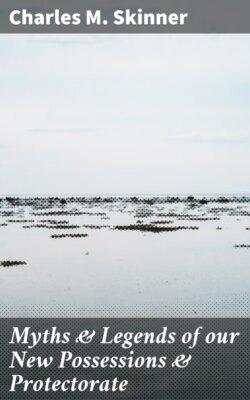Читать книгу Myths & Legends of our New Possessions & Protectorate - Charles M. Skinner - Страница 11
На сайте Литреса книга снята с продажи.
Ponce
ОглавлениеTable of Contents
When Ponce de Leon visited and conquered Porto Rico he heard of the elixir of life. It may not have been among the springs of that island, but the natives had a faith in it and some of them referred it to the Bahamas. Their possible reason for this was to persuade the white men to go there and look for it, for they were not popular in Porto Rico, and this was the more to be regretted in Ponce’s case, because he was far from popular at home. At the court of Ferdinand and Isabella was a page who was handsome, spirited, and saucy. One of the daughters of the royal pair, wearied with the forms and ceremonies of her state, which, in the most punctilious court in Europe, were especially trying, found means to converse with this well-appearing, quick-witted scamp. A tattling courtier, recalling a faux pas of the last queen, and desiring no more scandals, reported that the princess had been seen to smile on the youngster. No guilt was proven upon him, but handsome pages were ill-chosen company for young women of blue blood.
Ponce de Leon was the page, and he was sent to the New World to discover something to the advantage of his own modesty, and incidentally to accumulate for shipment anything that might be useful to the Spanish treasury. He landed in Boriquen, as Porto Rico was then called, and began a general subjugation and slaughter of the natives. Some were slain in battle, but thousands were carried away and made to work in mines and on distant plantations, as slaves, until their health was destroyed, and they, too, were no longer an obstacle to Spanish control, though the lack of their hands was a hindrance to Spanish enterprise. Ponce took his share of the gold and treasure he had forced these unfortunates to supply, and went back to Spain with it. Sea air had spoiled his complexion, fighting had roughened his manners, slave-driving had made his voice coarse. Possibly, also, his princess had recovered from her disappointment. Maybe she had been married off to some nobody of Portugal, or France, or Austria, for state reasons, and had entered on the usual loveless life of royalty. Or she may have beguiled her maidenly solitude by drinking much wine of Oporto, Madeira, and Xeres with her dinner, thereby acquiring that amplitude of girth, that ruddiness of countenance, and that polish of nose, which add so little to romance. At all events, we hear nothing more of the affair.
In the course of years Ponce took to himself the gout, rheumatism, dyspepsia, and a few such matters, and he scolded his dresser more than usual because his clothes did not fit at the waist as they had done, once. He parted his hair with a towel, and it was grizzled where it curled about his neck and temples. Then he recalled the tales the Boriqueños had told of the bright waters that gushed from the earth amid banks of flowers—waters so sweet that who drank would drink again, and with every draught would throw off years and pain until at last he was a youth once more—a youth with hot blood, sparkling eyes, lithe muscles; a youth who saw the world full of beauty and adventure. Ah, to be once more as he was when the princess beamed on him; to throw away his cares, his ails, his conscience, his regrets; to sing and dance, to ruffle it with other cavaliers, to dice, to drink, to feast, to win the smiles of ladies! It was a joy worth trying to attain.
He sailed once more, an older, sober man. He discovered Florida, bathed in its springs, drank from its flower-edged streams, but to no avail. Bimini, the place of the living waters, evaded him. Boriquen, renamed Porto Rico, could offer no more. But, though his living presence passed, the first building on the island—the White House, near San Juan—remains, and he left his name in the town that was first among the Antillean cities to raise the flag of a republic that should wave over the continent he had helped to discover and colonize:—the city of Ponce.
